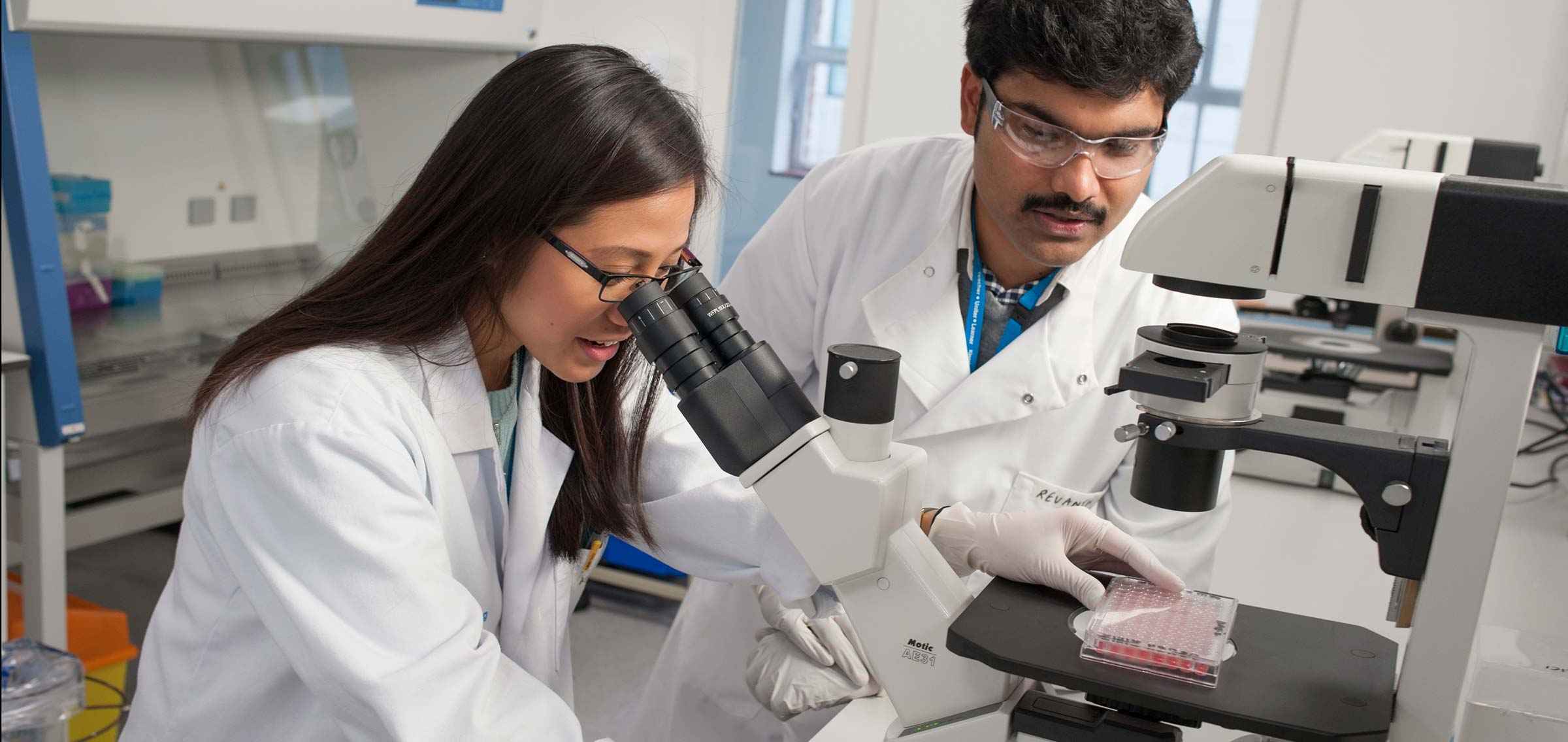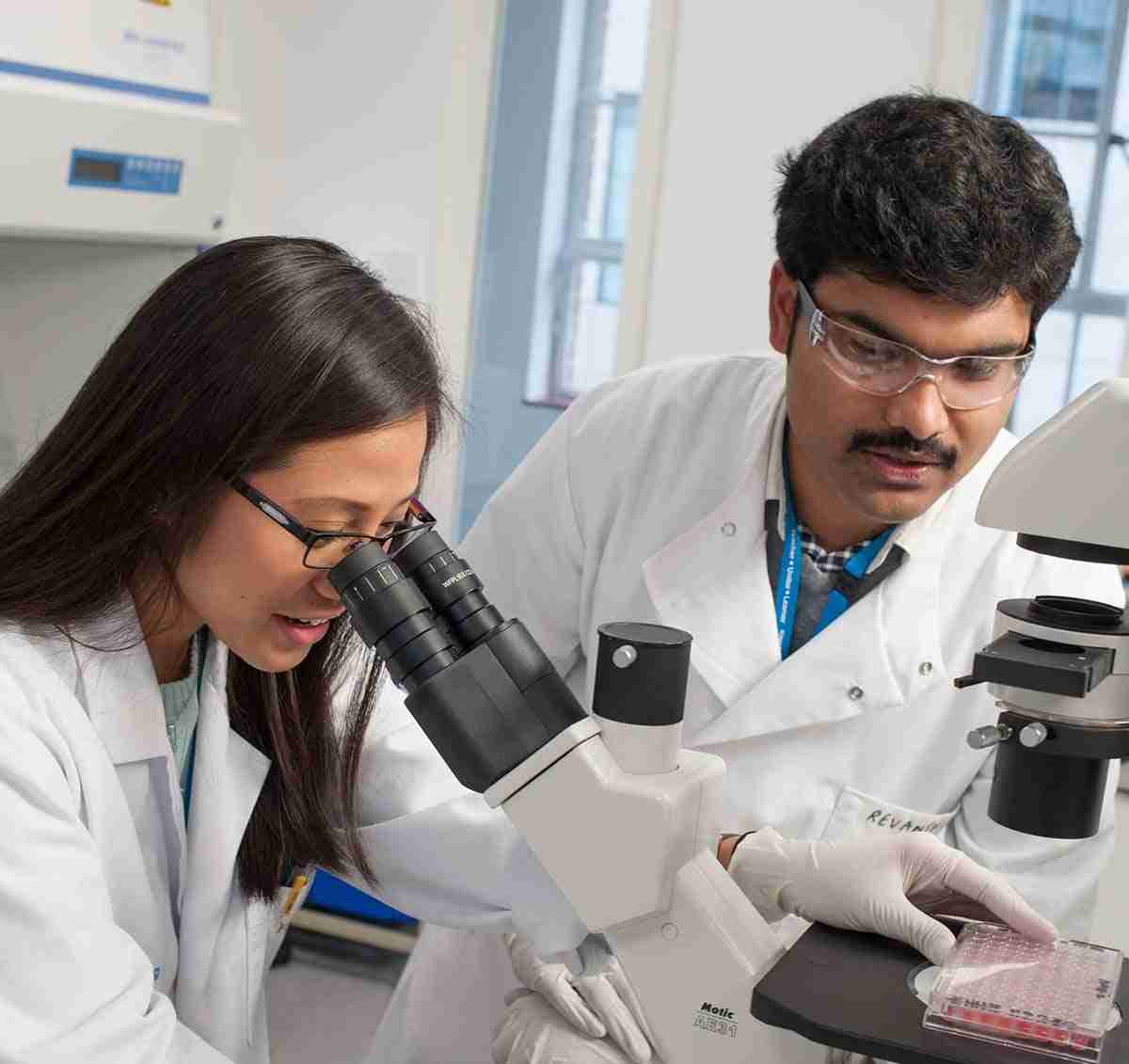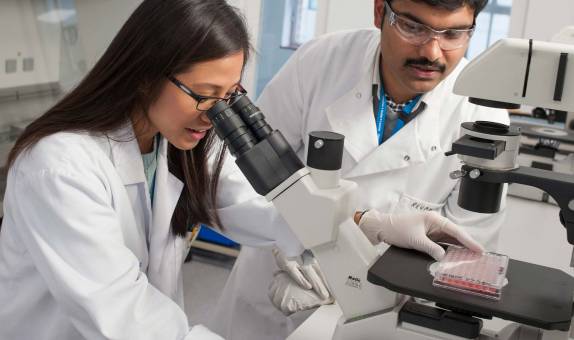Biomedical Science: Haematology with Management Studies MSc
Why choose this course?
This course links academic knowledge to the practical applications of biomedical science and management in a business context.
It offers a broad understanding of disease processes and their diagnosis, in-depth knowledge of immunology and haematology, and expertise in management practice.
You will carry out your laboratory project in your specialist subject which can be an excellent selling point when looking for a job or promotion.
Through the management module, you will develop skills in finance, accounting, marketing, organisational management, entrepreneurship and leadership, to enhance your employability and career potential.
| Mode | Duration | Start date |
|---|---|---|
| Full time | 1 year |
September January |
| Full time | 2 years including professional placement |
September January |
| Part time | 2 years |
September January |
Reasons to choose Kingston University
- This course is relevant to both professional biomedical and research careers. It offers an in-depth understanding of disease processes and diagnostic techniques.
- The University has extensive links with leading healthcare and research laboratories, such as GlaxoSmithKline, the Institute of Cancer Research and local hospitals.
- Flexible timetables and part-time options can help you fit your studies around other commitments.
What you will study
Modules
Modules
Business in Practice
30 credits
This postgraduate module covers the theory and practice of the business and management needs of students from different academic contexts such as, but not limited to Science, Engineering, Computing and Health Services who are aspiring team leaders, managers, and entrepreneurs in business within the context of the commercial, public, voluntary, or academic sector.
Students will investigate business topics ranging from finance, accounting, budgeting, and marketing, to organisational management by developing the leadership skills to meet business challenges and to cope with their complexity.
The module will explain and put into context business concepts to graduates from a variety of sectors including those encompassed by Science, Engineering, Computing and Health Services.
Haematological Malignancy
30 credits
The module initially explores how the haematopoietic system develops through the different stages of human development and growth, and then focuses on tumours of haematopoietic and lymphoid tissues, including acute and chronic leukaemias, myeloproliferative neoplasms, multiple myeloma, and lymphomas. The module examines the molecular basis of these diseases, as well as their pathophysiology, diagnosis and available treatment Students are encouraged to develop a critical approach to the subject through the use of case studies and data interpretation. Techniques used for the diagnosis of haematological malignancies are also explored in laboratory practical sessions.
Immunology and the Biology of Disease
30 credits
This module provides students with an introduction to the concepts of immunity and pathobiology. Students will become familiar with the different cells and organs of the immune system and how these function and interact to protect the body from infection. In addition, the module introduces students to the cellular mechanisms and genetic causes of disease considering both the physiological manifestations and the public health implications. The module also introduces some of the molecular processes and signalling events that are important in communication between cells of the immune system. It goes on to consider the role of cellular pathology in the context of other pathology disciplines such as clinical chemistry. Practical classes give students the opportunity to apply their basic knowledge of immunology to interpret the significance of laboratory data and the role of the immune system in disease.
Research techniques and scientific communication
30 credits
The module enables students to develop and extend skills required to research and communicate in biosciences, and the principles and practice of laboratory techniques, research planning, management, data handling and presentation. The material is contextualised by lectures, practicals, workshops and directed reading around the planning and execution of experiments and interpretation of the data in a clinical setting or in clinically-based studies.
Research Project
60 credits
This Research project module is the final stage in the MSc qualification and represents 60 Level 7 credits. It is designed as a 'capstone' module, and gives students the opportunity to use and synthesise the knowledge and skills they have acquired from the other taught modules in applied "real-world learning". It involves presenting work in formats appropriate to wider professional audiences, practising new and/or improved laboratory skills, and most importantly demonstration of the ability to independently solve complex problems.
Work placement scheme
Many postgraduate courses at Kingston University enable students to take the option of a 12-month work placement as part of their course. Although the University supports students in finding a placement and organises events to meet potential employers, the responsibility for finding the work placement is with the student; we cannot guarantee the placement, just the opportunity to undertake it. You may find securing a professional placement difficult as they are highly competitive and challenging, but they are also incredibly rewarding. It is very important to prepare and apply yourself if this is the route you wish to take. Employers look for great written and oral communication skills and an excellent CV/portfolio. As the work placement is an assessed part of the course, it is covered by a student's Student Route visa.
Find out more about the postgraduate work placement scheme.
Entry requirements
Teaching and assessment
A wide range of assessments are provided in the programmes. Assessments can be either formative or summative, the formative assessments being designed to provide students with the opportunity to practice assignments and receive feedback as a form of ‘feed-forward' for the summative assessments.
Assessments are designed to assess advanced skills and evaluation of information. In addition to formal examinations, coursework assessment formats are varied in nature and include written reports and essays, poster and oral presentations, a research proposal and in-class tests. They are often authentic in nature, designed around problem-solving exercises and case studies to develop students' research abilities and critical thinking. The research project, which comprises one third of the programme, is designed as a ‘capstone' project and aims to give students the opportunity to use and synthesise the knowledge and skills they have acquired during their degree.
Considerable effort is made to ensure that assessment loading for students is manageable, and assessment points are appropriately spread throughout the year. Each module has no more than three summative assessments, including any formal examination.
Who teaches this course?
This course is delivered by the School of Life Sciences, Pharmacy and Chemistry.
The School of Life Sciences, Pharmacy and Chemistry offers an outstanding and diverse portfolio of undergraduate and postgraduate programmes in biological and biomedical sciences, chemistry, forensic science, pharmacy, pharmacological and pharmaceutical sciences, and sport science and nutrition.
We've invested heavily in the development of new facilities including laboratories for teaching and research to provide students with access to ultra-modern equipment in a wide range of teaching facilities.
Postgraduate students may run or assist in lab sessions and may also contribute to the teaching of seminars under the supervision of the module leader.
Fees for this course
Additional costs
Depending on the programme of study, there may be extra costs that are not covered by tuition fees which students will need to consider when planning their studies. Tuition fees cover the cost of your teaching, assessment and operating University facilities such as the library, access to shared IT equipment and other support services. Accommodation and living costs are not included in our fees. Where a course has additional expenses, we make every effort to highlight them. These may include optional field trips, materials (e.g. art, design, engineering), security checks such as DBS, uniforms, specialist clothing or professional memberships.
After you graduate
Graduates have gone on to roles in a variety of biomedical science careers, including hospitals and commercial laboratories, research, teaching, management and sales.
Careers and recruitment advice
The Faculty has a specialist employability team. It provides friendly and high-quality careers and recruitment guidance, including advice and sessions on job-seeking skills such as CV preparation, application forms and interview techniques. Specific advice is also available for international students about the UK job market and employers' expectations and requirements.
The team runs employer events throughout the year, including job fairs, key speakers from industry and interviews on campus. These events give you the opportunity to hear from, and network with, employers in an informal setting.
How we work with industry partners
Our links with industry provide a practical base for our courses. They also help us to ensure your studies are kept up to date and relevant to the workplace.
This course includes:
- up-to-the-minute information from practising biomedical scientists; and
- visits to specialist laboratories to enhance your knowledge of the working environment.
Current research in this subject
Many of our staff in the Faculty are research active. This ensures they are in touch with the latest thinking and bring best practice to your studies.
Research focuses on the interaction of chemistry and life sciences with medicine. It is divided into three main sub-areas;
- Therapy – including immunology, stem cell research and allergenic effects of foods;
- Parasitology – including parasite transmission, drug responses and host cellular immune responses; and
- Pharmaceutical Sciences – including the use and understanding of free-radical reactions and the use of anti-cancer drugs/new bioactive natural products.
Get professional experience alongside your studies
We work with a variety of employers such as hospitals, community health care, NHS foundation trusts, academic publishers, and pharmaceutical companies, many of which also offer professional experience opportunities for our Biomedical Science with Management Studies MSc students.
Benefits of professional experience
- Get work experience in a scientific environment – making you more employable
- Work on a project of benefit to the employer
- Develop transferable skills and enhance your CV
- Make professional contacts
- Receive a work reference at the end of a successful placement
What's on offer
- Part-time, unpaid and either office or laboratory-based
- Flexible to fit in with your studies and the employer's needs
- An academic supervisor allocated to all placement students
- Should encompass 200 hours of work during the period October to April alongside studies
Professional experience could include
- Conducting discrete pieces of research, investigation, and fact finding
- Supporting laboratory work such as ensuring that Material Safety Data Sheets (MSDS) are available for all lab materials
- Assessing, archiving, sorting, transcribing, and filing scientific documents and files
- Taking minutes in meetings involving scientific content
How to get professional experience
Competition to gain professional experience is fierce and places are not guaranteed. During Induction Week, you will be introduced to the scheme and the Kingston University Careers and Employability Centre resources where you will find a CV and covering letter template.
All applications must use these CV and covering letter templates, which are accessed via your KU account. Therefore, to apply for the Professional Experience opportunities, you must first be a student enrolled on an eligible MSc programme.
The KU Careers and Employability Centre will help you to complete your CV and covering letter, so that you can make your best application for the scheme. CVs and covering letters are reviewed by employers and students chosen for interview are supported to prepare by the Careers and Employability Centre.
Please email Lori Snyder for any general information you need about the professional experience scheme.
Course changes and regulations
The information on this page reflects the currently intended course structure and module details. To improve your student experience and the quality of your degree, we may review and change the material information of this course. Course changes explained.
Programme Specifications for the course are published ahead of each academic year.
Regulations governing this course can be found on our website.



